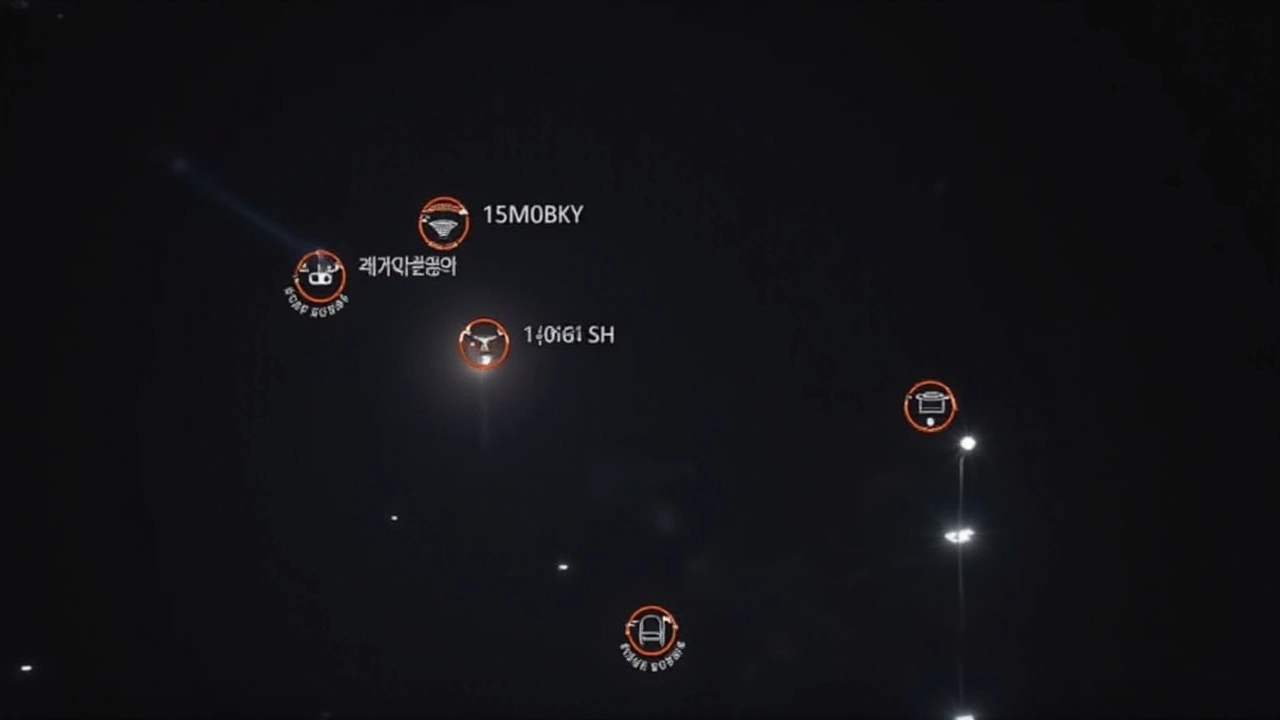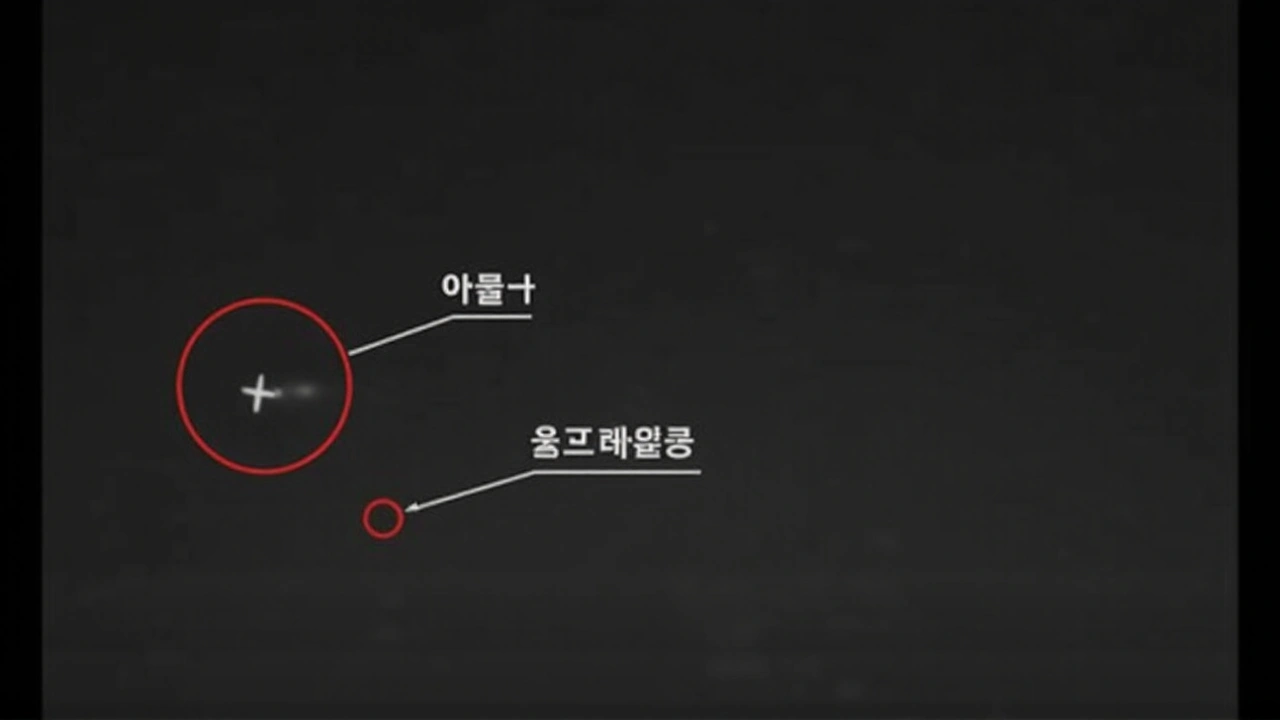Tensions Rise as South Korea Warns North Korea Over Drone Conflict
 Oct, 13 2024
Oct, 13 2024
High Tensions on the Korean Peninsula
The Korean Peninsula has seen escalating tensions in recent times, as fiery accusations and stern warnings form the backdrop of a complex geopolitical scenario. On a recent Sunday, South Korea’s Defense Ministry issued a grave warning to North Korea, that any attempt to harm South Korean citizens would be met with severe repercussions, potentially triggering the downfall of the North Korean regime itself. This warning follows accusations made by North Korea regarding alleged drone incursions and propaganda dispersals by South Korea over North Korean airspace.
The Genesis of the Controversy
The root of the current strife can be traced back to North Korea's allegations, which surfaced recently, accusing South Korea of using unmanned aerial vehicles (UAVs) to fly over North Korean territory and drop propaganda leaflets. This accusation, stemming from incidents reportedly occurring on October 3 and other days last week, has stirred a hornet's nest of threats and counter-threats between the neighboring nations. North Korea's Kim Yo-jong, the eminent sister of the country's leader Kim Jong-un, has accused South Korea of orchestrating a direct provocation by deploying drones laden with leaflets critical of the North Korean regime.
Not Just Words: Concrete Threats
In her fiery discourse, Kim Yo-jong warned that the discovery of another South Korean drone in the skies over Pyongyang could usher in disastrous consequences. She deemed these perceived incursions an infringement on North Korean sovereignty and speculated dire outcomes should such actions recur. North Korea’s heightened rhetoric manifests a deeply ingrained anxitorial stance and suggests a desire to consolidate domestic sentiment by painting South Korea as a perpetual external threat. As a reaction to these provocative accusations, South Korea's Defense Ministry branded the North’s allegations as a typical ploy orchestrated to sow discord within South Korean ranks and divert attention from the socialist state's internal struggles.
Domestic Power Dynamics
South Korean National Security Advisor Shin Won-sik provides a nuanced interpretation of North Korea's intentions. He suggests that the North Korean regime thrives on external threats to bolster internal cohesion—a tactic often employed by authoritarian regimes to consolidate power and suppress dissent. By portraying South Korea as a menacing threat, the North is not only avoiding acknowledging weaknesses in its air defense systems but also rallying internal support amid its populace, which faces severe economic and social challenges. Shin negated apprehensions that the North might instigate an armed conflict akin to the harrowing Korean War unless it is prepared for self-destruction, affirming that, from a strategic standpoint, such divide might not be feasible for the hermit kingdom.
From Words to Actions
The international audience has witnessed North Korea releasing photographs purportedly depicting South Korean drones within its bounds, along with images of anti-Pyongyang leaflets presumably released by these drones. Although the leaflets were blurred in images released by the North, analysts deduced that their contents decried North Korea’s decision to prioritize military expenditure over feeding its impoverished populace. In retaliation, North Korea has deployed more than 20 balloons scrubbed with debris across the demilitarized zone, with at least ten of those descending in Cheorwon in Gangwon, South Korea. Fortunately, none of these wayward balloons contained hazardous elements.
South Korea’s Strategic Stance
Although North Korea remains steadfast in its accusations, South Korea has chosen a more strategic retort characterized by ambiguity. When prompted, Seoul’s officials remained tight-lipped on the veracity of the drone allegations. South Korean Defense Minister Kim Yong-hyun opted for a tactful response during a parliamentary hearing, initially denying the deployment of the alleged drones. This ambiguity aligns with South Korea’s strategic motivations to maintain an element of unpredictability and possibly prepare for any future contingencies that may arise from this aerial espionage controversy.

The Bigger Picture
The ongoing developments signal a fragile equilibrium on the Korean Peninsula, accentuated by North Korea's austerity in handling dissent through external diversions and South Korea's measured approach in responding to provocations. As these two nations engage in a war of words and psychological strategies, the potential for resolution hinges on robust diplomatic efforts, in tandem with gauging the impacts of heightened military readiness on both sides. The situation underpins the necessity for global stakeholders to remain vigilant, advocating for peaceful dialogues to defuse what could spiral into a conflict with far-reaching consequences across the region.

Carol Wild
October 13, 2024 AT 18:19One cannot help but observe that the ever‑escalating drone drama on the Korean Peninsula appears to be a meticulously orchestrated spectacle designed to keep the global media entranced, while the true architects of this chaos remain shrouded in layers of obfuscation that only the most discerning conspiratorial minds can begin to untangle. The narrative presented by the South Korean Defense Ministry, with its solemn warnings, seems less a genuine deterrent and more a calculated move to portray a façade of control, thereby deflecting attention from deeper, perhaps more sinister machinations at play behind the curtains of geopolitics. In my view, the alleged leaflets dropped by unmanned aerial vehicles are not merely propaganda tools but symbolic gestures, reminiscent of a centuries‑old playbook used by authoritarian regimes to manufacture external threats for internal consolidation, a strategy that has been repeated ad infinitum across various theatres of conflict. Moreover, the images released by the North Korean apparatus, although apparently grainy, are likely engineered with a level of precision that suggests a sophisticated propaganda department capable of manipulating visual evidence to inculcate fear among the South Korean populace. It is reasonable to postulate that the balloons laden with debris, which have been reported as harmless, might actually serve a dual purpose: first, to maintain a veneer of benign intent, and second, to discreetly test the responsiveness of South Korean air defenses in a low‑risk environment, thereby gathering valuable intelligence for future operations. The timing of these incidents, coinciding with heightened diplomatic negotiations in other parts of the world, cannot be dismissed as mere coincidence; rather, it appears to be a synchronized effort to distract and destabilize any emerging consensus that could threaten the status quo. Critics who dismiss these events as trivial provocations are, in my estimation, either willfully ignorant or complicit in a grand narrative that seeks to normalize the perpetual state of tension for the benefit of those wielding the levers of power. In addition, the rhetoric employed by Kim Yo‑jong, with its apocalyptic overtones, is intentionally hyperbolic, designed to cultivate a siege mentality among North Korean citizens, thereby justifying the regime's internal repression and resource allocation toward military expenditures at the expense of basic human needs. Conversely, the South Korean authorities’ strategic ambiguity-denying the drones while simultaneously preparing contingency plans-speaks to a deeper, perhaps covert, collaboration that might involve intelligence sharing with allied powers whose interests align with maintaining a volatile status quo. As observers, we must remain vigilant, scrutinizing each press release, each photographic revelation, and each parliamentary statement for hidden subtexts that reveal the underlying power dynamics at play. In sum, the drone conflict, while seemingly a low‑intensity skirmish, is emblematic of a larger, orchestrated endeavor to perpetuate a climate of fear, rally domestic support, and entrench geopolitical hierarchies that benefit a select few while the ordinary citizens of both Koreas endure perpetual uncertainty.
Rahul Sharma
October 27, 2024 AT 17:19Firstly, the incident provides a perfect case study for understanding how modern UAV technology can be leveraged in psychological operations, and, to dissect the matter further, one should consider the flight path analytics, the payload composition, and the timing relative to regional diplomatic engagements; secondly, the geopolitical context suggests that the South Korean response aligns with a broader deterrence doctrine historically rooted in the Korean Peninsula's security architecture, which inevitably involves close coordination with allied defense mechanisms, and finally, it is essential to note that the use of propaganda leaflets has a storied history dating back to the Cold War, thereby underscoring the cyclical nature of such tactics.
Emily Kadanec
November 10, 2024 AT 17:19I think u all overthink this drama, it looks like a simple mess up with some drones, and people are making a huge deal out of it. The leaflets were probably just some cheap pamphlets, and there is no deep secret agenda. Most of the talk about "strategic ambiguity" is just buzzword nonsense. Honestly, the whole thing is just a media circus to get clicks.
william wijaya
November 24, 2024 AT 17:19While I hear the concerns, let's examine the operational parameters: the drones' flight ceilings, the aerodynamic signatures, and the payload distribution all point toward a test run rather than a full‑blown offensive. The jargon here is critical-terms like "EW countermeasures" and "flight corridor deconfliction" indicate a nuanced approach to maintaining airspace integrity without escalating to kinetic conflict. The psychological impact on civilian morale, especially in border regions, cannot be discounted, but it remains a controlled variable within a larger strategic framework.
Lemuel Belleza
December 8, 2024 AT 17:19Again, this seems like a typical overblown narrative. Nothing new here.
faye ambit
December 22, 2024 AT 17:19We might consider this moment as an invitation to reflect upon the deeper implications of external aggression narratives. When a society is constantly reminded of external threats, its internal cohesion can either fragment or solidify, depending on the moral wisdom of its leaders. The balance between vigilance and paranoia must be navigated with thoughtful dialogue, not with fear‑mongering. It is essential that we foster spaces where compassionate discourse can replace confrontational posturing.
Subhash Choudhary
January 5, 2025 AT 17:19Dude, honestly, these drone stories are just another episode of the usual drama. No biggie, just some tech toys floating around, and people making a fuss. Stay chill, it’ll pass.
Ethan Smith
January 19, 2025 AT 17:19From a diplomatic standpoint, it is prudent to maintain a measured tone. Both parties should engage in transparent communication channels to verify the facts surrounding the UAV sightings. Precision in language helps reduce misunderstandings and prevents inadvertent escalation.
Evelyn Monroig
February 2, 2025 AT 17:19It’s obvious the North is pulling strings to sow chaos, all part of a grand design to keep the world distracted while the elite puppeteers pull the strings behind the curtain. Wake up, people! The drones are just the tip of the iceberg, and the real agenda is far darker than anyone admits.
Gerald Hornsby
February 16, 2025 AT 17:19Life is a stage, and the drones are merely props. 🎭
Hina Tiwari
March 2, 2025 AT 17:19i think its kind of sad that we keep talkin about these drones when there are real peopel sufferin out there. maybe we shoud focus on helping those in need, not just the big politics stuff.
WILL WILLIAMS
March 16, 2025 AT 17:19Boost the morale! Let’s channel this buzz into positive action-ignite change, spark hope, and turn tension into triumph!
Barry Hall
March 30, 2025 AT 18:19Thanks for the insight, very clear. 👍